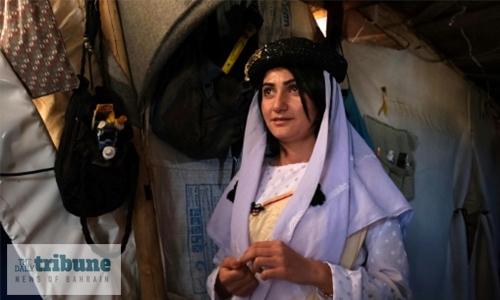From captive to activist
At only 18, Iman Abbas has overcome suffering that would break many -- the Yazidi was repeatedly sold as a “slave” by jihadists but escaped to become an award-winning advocate for fellow survivors. “Because of what I’ve been through, I don’t consider myself a teenager,” the softly-spoken Abbas said in her family’s modest two-room tent in the Sharia displacement camp in northern Iraq’s Kurdish region.
The tall, dark-haired young woman recently returned from Mumbai, where she received the prestigious Mother Teresa Memorial Award on behalf of the region’s Yazidi Rescue Office (YRO), with whom she works. The YRO has helped rescue around 5,000 Yazidi girls taken captive when the Islamic State group swept through the minority’s ancestral homeland in northwest Iraq in 2014. Receiving the award was “emotional”, recalled Abbas, wearing a traditional Yazidi layered white robe and headpiece.
“When I shared my story and the stories of other Yazidi female survivors, some attendees started crying,” she said in an interview ahead of the International day for the Elimination of Violence against Women, marked on Monday. “The ceremony lessened some of my pain, but it increased my responsibility of helping other women survivors.” Abbas was just 13 when IS stormed through the rugged villages of Sinjar, forcing thousands of Yazidi women and girls into “sex slavery”, killing men en masse and taking the boys as child soldiers.
She was immediately separated from her family by the jihadists, who proceeded to sell her and other Yazidi women on “slave markets” to IS members. Abbas was sold three times, eventually ending up with a 40-year-old Iraqi IS doctor who pledged to set her free if she memorised 101 pages of the Muslim holy book, the Quran.
‘Painful stories’
Yazidis are a Kurdish-speaking ethno-religious minority, so learning to recite new religious texts in Arabic was an enormous challenge for the terrified teenager. “Every day, he was asking me to sit in front of him and recite the Quran. I was able to memorise 101 pages in one month and four days,” she said. Her captor promptly took her to an IS court in the group’s Iraqi bastion of Mosul to issue a formal document from its self-styled “caliphate”, declaring Abbas “a free Muslim girl”. She found her away to Tal Afar in northwest Iraq, where the rest of her family had been put to work as IS slaves tending to flocks of sheep.
In 2015, they were rescued by YRO and resettled in Sharia, a sprawling camp now home to over 17,000 displaced Yazidis. Now, Abbas spends half her days in school and the other half working with the very same office that rescued her. IS lost its Iraqi strongholds in 2017 and was ousted from its last shred of territory in neighbouring Syria in March. Hundreds of Yazidis who had been held captive for years streamed out as the last vestiges of the jihadists’ “caliphate” crumbled.
But several thousand remain unaccounted for, according to the YRO. Some have converted to Islam and still live with Muslim families, too afraid, ashamed or “brainwashed” to come home, Yazidi officials say. Abbas said part of her mission at YRO, where she started working just under a year ago, is to coax these women and girls into returning to their original families. She has also interviewed more than 50 rescued girls to document their stories in the organisation’s archives, a job which she says makes her “sad and happy at the same time”.
“I have to hear all these horrible stories, each one different from the other. They’re all very painful, some even more painful than my own,” she said. But she is also proud of the work she does: “I’m glad to be part of the process of rescuing women survivors.”
Only the beginning
Her path has echoed that of Nadia Murad, the Yazidi survivor who won the Nobel Peace Prize last year for her advocacy work. Since her Mumbai trip, Abbas has herself become something of a mini-celebrity, especially within the camp where she lives. Her parents field phone call after phone call expressing congratulations and thanks for their daughter’s activism. “I noticed Iman has become happier and stronger since she started to share her story publicly,” said her father Abdullah, proudly telling AFP she has already swayed his opinions on the power of storytelling.
“At first, whenever she talked about her captivity, I used to turn my back to her because it was very painful for me to listen to her face-to-face,” he said. But now he wants every Yazidi survivor to speak out, believing it will both help the individual and the broken minority.
Abbas is now taking English courses -- but they’re only the beginning of her activist ambitions. “In the future, I want to become a lawyer to get familiar with Iraqi and international law so I can defend the rights of Yazidi female survivors as well as other IS victims,” she said.
Related Posts

